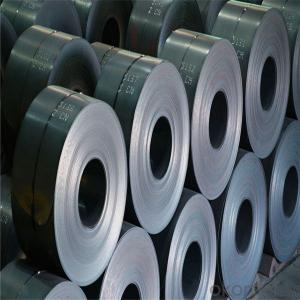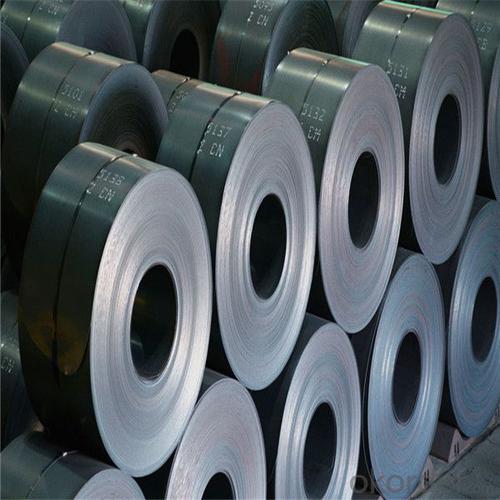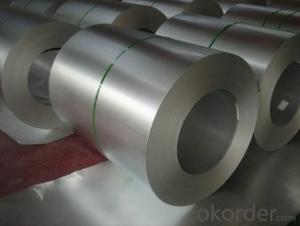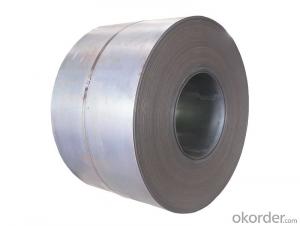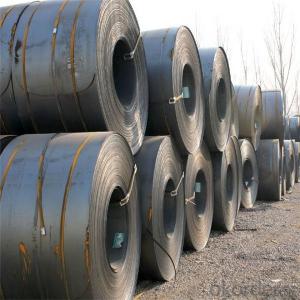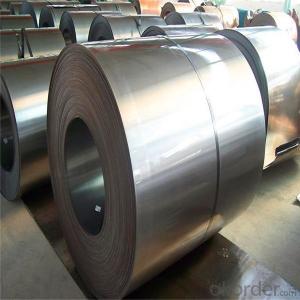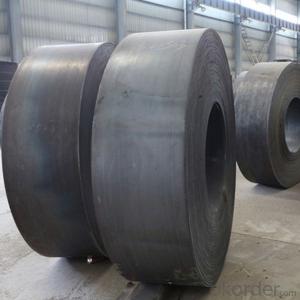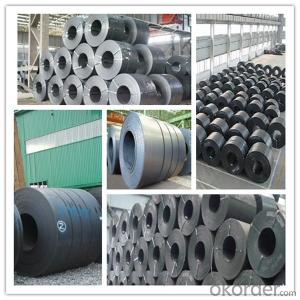Sheet steel in coil hot rolled for sale in different grade
- Loading Port:
- Tianjin
- Payment Terms:
- TT OR LC
- Min Order Qty:
- 100 m.t.
- Supply Capability:
- 16792 m.t./month
OKorder Service Pledge
OKorder Financial Service
You Might Also Like
Specification
Hot rolled steel actually reconfigures itself during the cooling process, giving the finished product looser tolerances than the original material and when compared to cold rolled steel products. Hot rolled steel is more malleable, allowing it to be forced into a variety of different shapes.
This makes hot rolled steel a good choice for the manufacturing of structural components, such as I beams or simple cross sections, such as rail tracks. It is also used to produce sheet metal.
Our Advantage: High quality steel products from 1 class mills in China
Reasonable price
Professionalism of the products
On-time delivery
Complete documents and certificates
Sincere service to meet our clients' requirements
Standard and Grade :
Hot rolled steel coils | ||||
JIS | ASTM | SAE | EN | |
Commercial quality | G3131 SPHC | A569 A635 A659 A1011 CS Type A,B,C | 1006~1025 |
10111 DD11 |
Drawing quality | G3131 SPHD | 1006~1010 | 10111 DD12 | |
Deep drawing quality | G3131 SPHE | A622 A1011 DS Type A,B | 1006~1010 | 10111 DD13 DD14 |
General structure (T.S.<490N/MM2) | G3101 SS330 SS440 G3106 SM400A G3132 SPHT1 SPTT2 SPHT3 | A36 A283 GR.C A570 GR.30~40 A1001 SS GR.30~40 |
1010~1025 | |
General structure (T.S.≥490N/MM2) | G3101 SS490 G3106 SM490A SM490YA | A570 GR.45~50 A607 GR.45~70 A1011 SS GR.45,50 |
J1392 050X | |
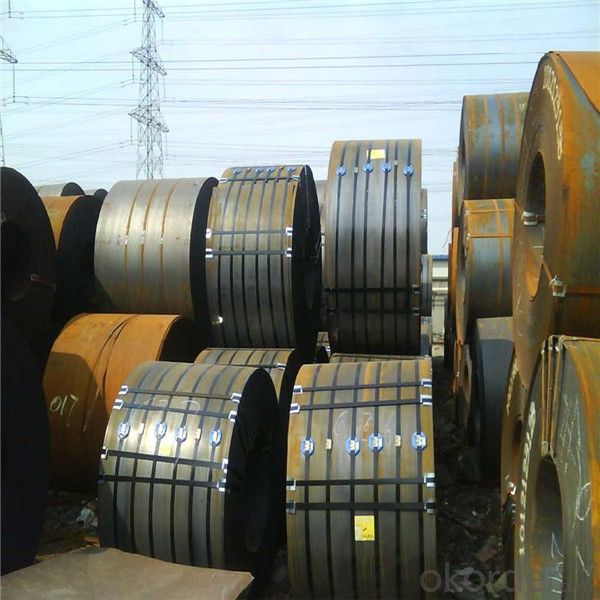
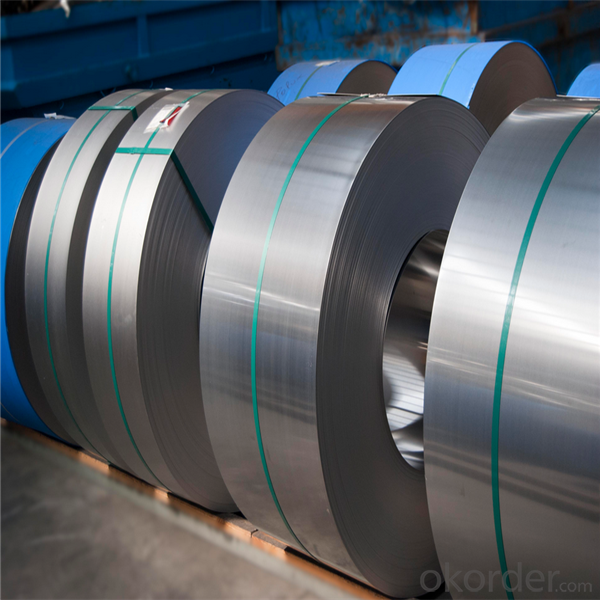
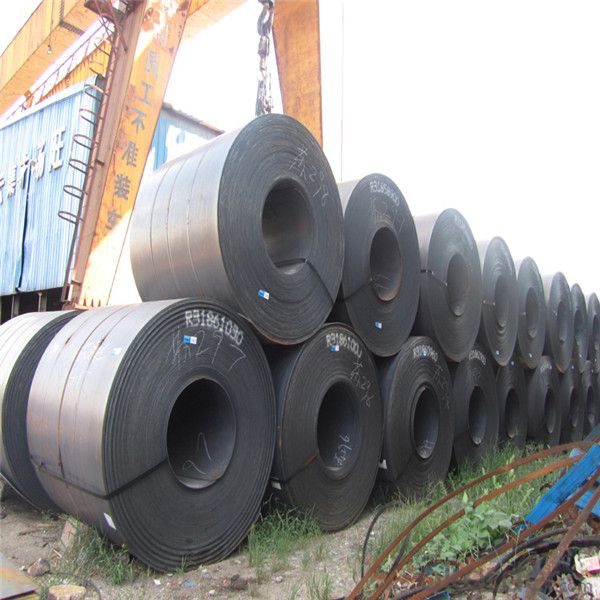
Packing:
Packaging Detail | The packing of coil consists of anti-damp paper ,PVC film ,hardboard paper , steel box , strapped with steel strips, fitted with locks and edge protectors and guarantees the optimal condition of the delivered goods. Each coil can be additionally fitted with wooden/steel skids(eye of the side) or wooden pallets(eye of the sky) |
Delivery Time | within 30 days of receipt of LC original or prepayment |
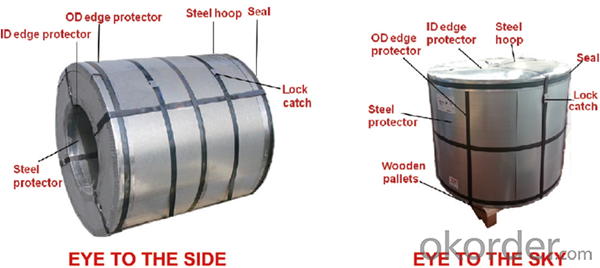
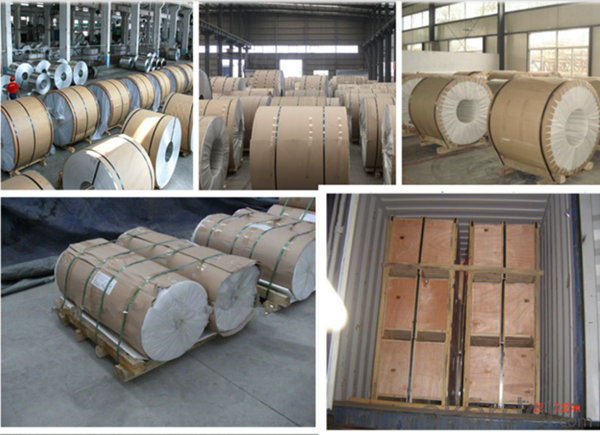
Our Services
MOQ | FCL, 25 metric tons per 20GP, can be assorted with different sizes. |
LCL for trial order is acceptable. | |
Price Term | EX-WORK, FOB China Port, CNF, CIF |
Payment | T/T, 30% advanced payment before production and balance before shipment; OR Irrevocable L/C at sight. |
Delivery Time | within 30 days of receipt of LC original or prepayment |
FAQ:
1. How to guarantee the quality of the products?
We have established the international advanced quality management system,every link from raw
material to final product we have strict quality test;We resolutely put an end to unqualified products
flowing into the market. At the same time, we will provide necessary follow-up service assurance.
2. How long can we receive the product after purchase?
Usually within thirty working days after receiving buyer’s advance payment or LC. We will arrange the factory manufacturing as soon as possible. The cargo readiness usually takes 15-25 days, but the shipment will depend on the vessel situation.
- Q: Hello,is it possible to divide an alloy in its own elements? I am particularly interested in Stainless Steel, which is made of Nickel, Chrome and Iron. Do you have an idea of where can I find some more information (blogs, reviews, sites or books)?Thanks for your help
- Yes it is possible to recover individual elements from an alloy such as stainless steel, but not easy. Look up etching of stainless steel on google. This same etching solution will completely dissolve stainless steel. These solutions are strong acids such as H2SO4 and HNO3 so safety goggles and good ventilation are absolutely required. Once the metal has been dissolved, then you would need to use a qualitative analysis scheme to precipitate out the different metals one at a time as compounds, then do additional reactions to recover the metallic elements.
- Q: What is the standard length of steel coils?
- The standard length of steel coils can vary depending on the industry and specific requirements, but common lengths range from 30 feet to 60 feet.
- Q: many sword sellers sell swords made of 440 and stainless, i know those are both totally **** for real swords. so are 1045, 1060, or 1095 good grades of steel for a sword?
- You'll okorder has a great introductory articles on metallurgy as it pertains to swords. Check 'em out.
- Q: Why is steel so important? How does it help us in everyday life?
- steel comes from iron. Iron is a natural resource and is abundent in nature. so being able to turn it into steel means it can be used for alllll sorts of things! from buildings, cars, piping and tubes, to washing machines, appliances and many other things. its used in our everyday life and is a great, strong material.
- Q: I heard that titanium isn't the most hypoallergenic metal because it is treated and the chemicals can cause an allergic reaction. I also heard that surgical steel is the best because it is what is used in surgery and in hip replacement implants etc. Is this correct?I've always heard that titanium is best, but now I'm curious because surgical steel is much cheaper than titanium which can be expensive.Thanks
- There is a lot of debate in the piercing community about guns vs. needles. In my opinion, needle piercing from a reputable piercing shop is the best choice. This is because guns can harbor a lot of bacteria, especially if they are used on more than one person which they often are. Yes, guns are fast and efficient, but they can be unsafe at times. My first lobe holes were done with a gun. I cried forever because it burned so bad...even after days. They lady was so impersonal, and they used sterling silver which I found out that day I was allergic to. My other 4 holes are were done with a needle. I had trouble healing them because I used sterling silver (my stupid fault), but besides the allergy, they healed beautifully and were virtually pain free. I would recommend getting them pierced at an actual shop, not the mall. If I were you, I would chose niobium metal or titanium to avoid any type of allergy that could happen. Choose studs and not rings because they are easier to heal. Good luck!
- Q: Does te game end with broken steel? What is broken steel? I bouht it cuz my buddy said I should.
- you will see the conventional ending on the tip, yet once you have BS downloaded you will awaken to start up a sparkling quest extremely than having the activity in basic terms end. Vault one 0 one won't open back up, you in basic terms get to bypass back for the hassle on the homefront quest. and 3, as quickly as you have BS downloaded the activity will never end
- Q: How are steel coils used in the production of steel handles?
- Steel coils are used in the production of steel handles by being processed and shaped into the desired handle form. The coils are uncoiled and cut into appropriate lengths, which are then shaped and bent using various machinery and techniques. The resulting steel handles are sturdy, durable, and able to withstand the demands of everyday use.
- Q: What are the common coil packaging materials?
- Common coil packaging materials include plastic wrap, stretch film, steel strapping, and wooden crates. These materials are used to protect and secure coils during storage and transportation, ensuring they remain intact and undamaged.
- Q: How are defects in steel coils detected and resolved?
- Defects in steel coils are detected through various methods such as visual inspection, ultrasonic testing, magnetic particle inspection, and eddy current testing. Once a defect is identified, it is resolved through processes like grinding, welding, or cutting out the affected area. In some cases, the entire coil may need to be rejected or sent for further processing to eliminate the defect.
- Q: Help please.What atoms are there in steel?Like water is equals to 1 Oxygen atom + 2 Hydrogen atoms.Thnx 4 d help.
- Steel is mostly iron with a small amount (less than 1%) of carbon added. Stainless steel has other metals like chromium and nickel added.
Send your message to us
Sheet steel in coil hot rolled for sale in different grade
- Loading Port:
- Tianjin
- Payment Terms:
- TT OR LC
- Min Order Qty:
- 100 m.t.
- Supply Capability:
- 16792 m.t./month
OKorder Service Pledge
OKorder Financial Service
Similar products
Hot products
Hot Searches
Related keywords
